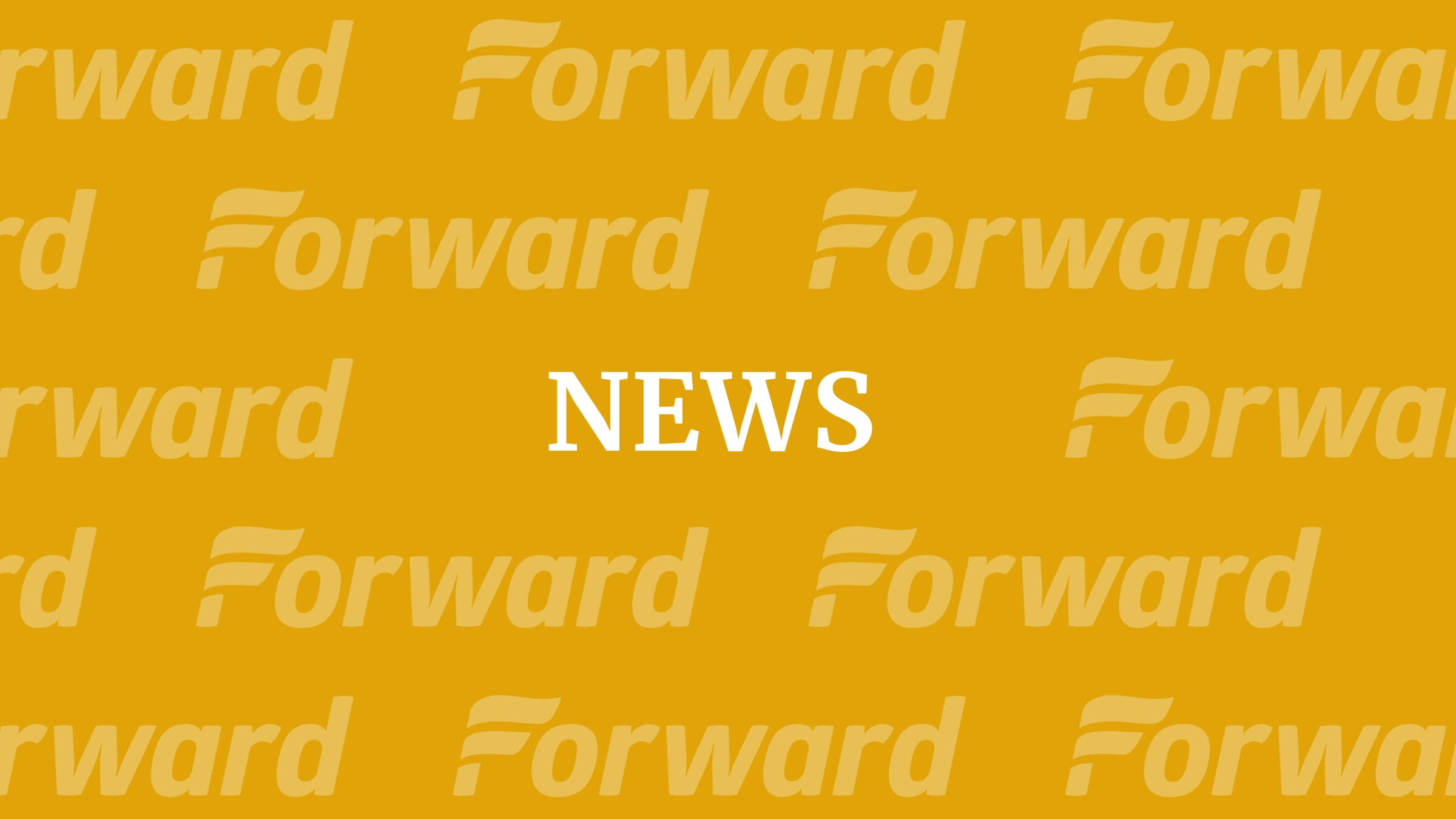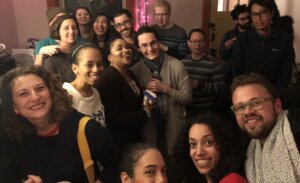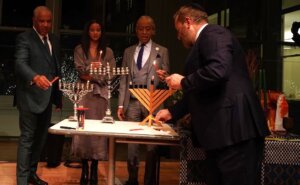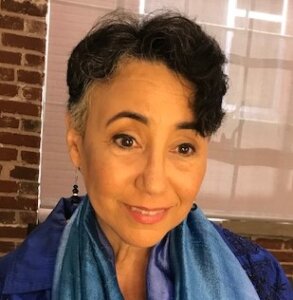Kwanzakkah: A way to celebrate dual heritage, and combat hate
This year’s observance of both Hanukkah and Kwanzaa leads to 15 Days of Light

Graphic by Angelie Zaslavsky
Hanukkah began on the night of Dec. 18 and lasts until Dec. 26. Then, the seven days of Kwanzaa begin.
For those who observe both, the 15 straight days of candle-lighting, which came close on the calendar in 2006 and will again in 2041, has led to the portmanteau Kwanzakkah.
If it started as a clever joke – in 2007 Virgin Mobile launched an over-the-top ad campaign celebrating an even more inclusive “Chrismahanukwanzakah” – it’s being taken seriously today.
Two observances accentuate that. A full-page ad in The New York Times on Dec. 17 featured Jewish and Black leaders calling for “Fifteen Days of Light,” with candles to be lit for the duration of both holidays. The goal is “to dispel the darkness of racism and antisemitism in America.”
And on Monday, the Black Jewish Liberation Collective will host Kwanzakkah 5783. It’s being held both online and in person at events in New York City, New Orleans, Atlanta, Los Angeles, and Madison, Wisconsin.

‘While I’ve definitely had intercultural celebrations, this was my first time doing a Black and Jewish and American thing at the same time.’
“That’s a really fun and interesting part of the work, seeing the different textures of organizing that happen across the country and speaks to the different regional needs,” said the event’s organizer, Kohenet Shoshana A. Brown, the collective’s co-founder.
Growing up in a Black and Jewish household, Brown celebrated both Hanukkah and Kwanzaa. She began coordinating a Kwanzakkah celebration in her Park Slope, Brooklyn, home in 2016.
“I invited a bunch of Jews of color to come together. That was the first public celebration that we had,” Brown said. As BJLC’s reach became national, it added an online Kwanzakkah option in 2017 for members around the country. Though many of the celebrants are both Black and Jewish, the event is open to people of all backgrounds who can register here and here.
The “Fifteen Days of Light” observance is also open to all people; anyone can participate by lighting a menorah and a kinara, the seven-branched candelabrum for Kwanzaa. But it is particularly focused on unity between the Black and Jewish communities. The call comes in the wake of the recent rise in antisemitic incidents in the U.S., as well as continuing racial attacks including the murder of George Floyd in 2020, the mass murders of African Americans at a Charleston, S.C. church in 2014 and at a Buffalo, New York, supermarket, this year, the ad notes.

“African American and Jewish communities share a common struggle to live in human dignity, devoid of hatred and oppression.”
The observance is spearheaded by philanthropist Robert F. Smith. Other organizers featured with him in The New York Times ad were Conference of National Black Churches Chairman W. Franklyn Richardson, who like Smith is Black and not Jewish, and author and TV host Rabbi Shmuley Boteach, and Elisha Wiesel, son of the Nobel Peace laureate and Holocaust survivor Elie Wiesel. Boteach and Wiesel are Jewish and not Black.
“African Americans and Jews have suffered immeasurably and are increasingly targeted today,” Elisha Wiesel wrote in the ad. “The lies that Jews are colonizers or oppressors are as vile as the lies that fueled Jim Crow. It is time to expose hate speech for what it is and leave no question that it is intolerable. My father lit Hanukkah candles even in Auschwitz; surely we too can find hope in the light.”
Likewise, Richardson wrote that the “African American and Jewish communities share a common struggle to live in human dignity, devoid of hatred and oppression.
“We both believe in a powerful God and have a legacy of strong faith,” he continued, “and are mandated to link resources to hold back the darkness of racism and antisemitism.”
Referring directly to the joint holiday celebrations, Boteach wrote: “The astonishing similarities of Hanukkah and Kwanzaa speaks to the shared spiritual heritage and eternal brotherhood of African Americans and Jews. Both our peoples have known and felt the cold chill of chains and the searing crucible of bondage. We have both endured wholesale slaughter and second-class status.”
Along with Smith, Richardson and Wiesel, Boteach attended the campaign’s kickoff at Carnegie Hall on Dec. 18, featuring violinist Joshua Bell and the Uniondale Church Choir, along with New York Mayor Eric Adams and the Rev. Al Sharpton, who helped to light the first night candles.
“It was an incomparable night of inspiration and uplift for Hanukkah and Kwanzaa, uniting the Black and Jewish communities,” Boteach told the Forward. He called on Jews to light candles for Kwanzaa — a cultural festival open to all religions — to show “how connected we are with our African American brothers and sisters.”
For those who are both Black and Jewish, that connection is inseparable, as the Black Jewish Liberation Collective’s Kwanzakkah 5783 observance stresses. That’s true even for those who haven’t always celebrated both holidays.
“My brother and I were raised in synagogue, went to Hebrew school, became bar and bat mitzvah, traveled to Israel, and celebrated Jewish holidays,” said Leah King, a Los Angeles-based artist, musician, and educator from New York of Black and Ashkenazi Jewish heritage. Her father, who is Black and not Jewish, also participated in Jewish life, singing along with menorah lightings.
But King said she knew little about Kwanzaa until she met Brown and participated in BJLC’s second Kwanzakkah in 2017.
“Kwanzakkah is probably one of the more organized and specific sort of bicultural programs that I was part of,” King said. “While I’ve definitely had intercultural celebrations, this was my first time doing a Black and Jewish and American thing at the same time.”
Kwanzaa is celebrated from Dec. 26 to Jan. 1 by African Americans and Pan-Africans worldwide. Founded in 1966 by Maulana Karenga, a professor of Africana studies at California State University, the name is Swahili for “First Fruits.” The kinara — which Karenga is said to have adapted from a menorah — is lit each night to invoke the holiday’s seven principles: Umoja (unity), Kujichagulia (self-determination), Ujima (collective work and responsibility), Ujamaa (cooperative economics), Nia (purpose), Kuumba (creativity), and Imani (faith).
To those, the BJLC has added an eighth: Ujasiri/Ometz Lev, or courage, using both the Swahili and Hebrew terms to honor the synthesis of traditions.
Along with lighting both the menorah and the kinara, the observance includes blessings and rituals outlined in BJLC’s Kwanzakkah guide.
Like the Fifteen Days of Light campaign, Brown said this year’s celebration is focused on relationship building, particularly among young Jews of color.
“It’s so lovely on Kwanzakkah to see these young people party, dance and have a great time. It’s part of our liberation that they get to grow up feeling totally seen and getting to have spaces where they can honor their full selves,” she said. “They get to be one person, one human, in a space with people who love and honor and celebrate that gift to the world.”

















